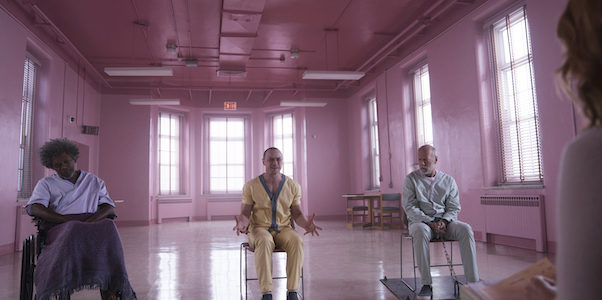
ReelBob: ‘Glass’ ★½
By Bob Bloom
M. Night Shyamalan’s “Glass” is less than half empty; it’s nearly drained.
This sequel to both his 2000 “Unbreakable” and 2016 “Split” is a total misfire in conception and presentation.
The premise had promise, bringing together Bruce Willis’ David Dunn and Samuel L. Jackson’s Elijah Price, alias Mr. Glass from “Unbreakable” and James McAvoy’s Kevin Wendell Crumb and his multiple personalities, as well as his surviving victim, Anya Taylor-Joy’s Casey Cooke from “Split.”
“Glass,” unfortunately, begins to crack after the first 20-plus minutes and shatters before the 129-minute fade-out, leaving behind shards of unfulfilled plot points, a convoluted story and a messy, lazy script that undercuts the few sound notions that writer-director Shyamalan devised.
To recap: In “Unbreakable” Willis, the sole survivor of a horrific train crash, learns that he has extraordinary powers, and that Jackson was the one responsible for the accident because he has been seeking people who, as in comic books, have special abilities and powers.
In “Split” McAvoy is an individual with a couple of dozen personalities, one of whom, The Beast, is the half-human, half-animal killer. McAvoy has kidnapped a group of girls and, at the end, only one, Taylor-Joy’s Casey, remains alive.
So, as “Glass” opens, we find four kidnapped cheerleaders chained together in a deserted warehouse and being guarded by one of McAvoy’s personas.
Willis’ Dunn, who now runs his own home security business, prowls the streets of Philadelphia at night, seeking out criminals. He has been dubbed “Overseer” and, like most vigilantes, is wanted by the police.
Dunn is seeking the kidnapped girl. He is aided by his son, Joseph (a now-adult Spencer Treat Clark), reprising his role from “Unbreakable.”
Dunn accidentally bumps into Kevin, one of McAvoy’s personalities, and realizes he is the kidnapper. He also, by touching Kevin, learns where the cheerleaders are being held.
Dunn rescues the girls and battles The Beast, but the fight is halted when a small army of cops capture them both.
They are taken to a mental hospital where Dr. Ellie Staple (Sarah Paulson), a psychiatrist, takes charge of them. Also, in her custody is Elijah.
Basically, Staple spends a good deal of the rest of the movie trying to disabuse the trio of their notions that they are special and have abilities other people do not.
I apologize for such a long explanation, but it is necessary, so you understand where “Glass” goes wrong.
Shyamalan offers the three main actors brief screen time together. He wastes too much time on Staple’s efforts to convince each, either separately or when meeting together, that they are disillusioned in believing that the things they can do are out of the ordinary.
That is one reason why “Glass” is slowly and unevenly paced.
Another is sloppy moviemaking — the trio are housed in a good-sized hospital, yet Staple seems to be the only staff member and security is minimal — which is strange, considering the threat of the individuals in-house.
It also doesn’t help that Jackson spends most of the movie in what appears to be a vegetative state, while Willis lumbers about and whispers his few lines of dialogue in a dull monotone.
Only McAvoy, as he did in “Split,” gets to display any versatility as he continually transforms from one personality to another. But even that becomes ludicrous because a series of flashing lights trigger the changes — sometimes so quickly that some of his various alter-egos can’t get out more than a line or two.
Shyamalan works hard trying to create a comic-book mythos but is constantly undercut by his clunky dialogue, which, at times, sounds like comic-book balloon captions, and convoluted exposition. A series of anticlimactic sequences, plus a plot twist that is as ridiculous as it is confounding, condemn “Glass” to the depths of such Shyamalan disasters as “The Happening” and “After Earth.”
“Glass” only serves to amplify the chorus saying that it’s time to say, good Night to Shyamalan’s time behind the camera.
I am a founding member of the Indiana Film Journalists Association. My reviews appear at ReelBob (reelbob.com) and Rottentomatoes (www.rottentomatoes.com). I also review Blu-rays and DVDs. I can be reached by email at bobbloomjc@gmail.com or on Twitter @ReelBobBloom. Links to my reviews can be found on Facebook, Twitter, Google+ and LinkedIn.
GLASS
1½ stars out of 4
(PG-13), violence, bloody images, language, disturbing elements